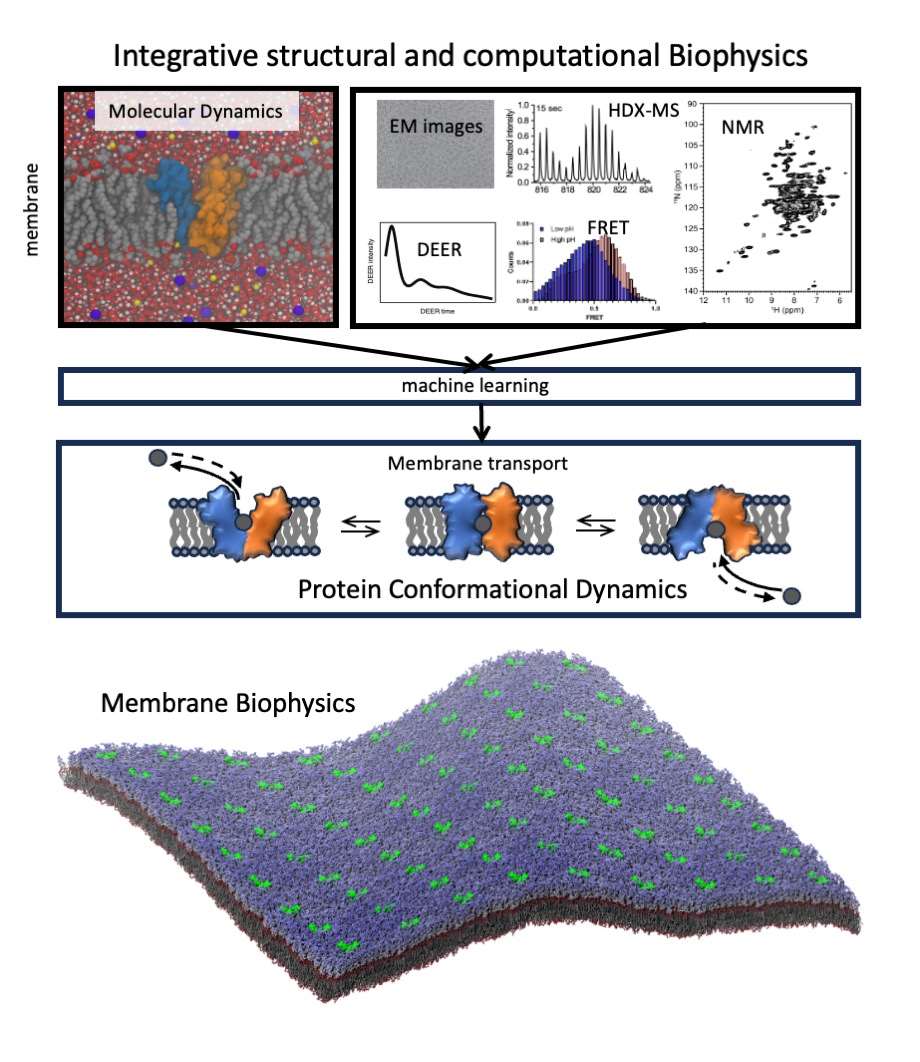
Fabrizio Marinelli, PhD
Associate Professor; Recruitment Director, Biophysics Graduate Program
Locations
- Biophysics
- MFRC 3040G
Contact Information
Education
Visiting Fellow, NHLBI, NIH, Theoretical Molecular Biophysics Section, Bethesda, MD, 2013-2016
PhD in Statistical and Biological Physics, International School for Advanced Studies, Trieste, Italy, 2009
MS in Chemistry, La Sapienza University, Rome, Italy, 2005
Biography
I earned my PhD in statistical and biological physics from the International School for Advanced Studies in Trieste, Italy, where I developed innovative molecular simulation techniques to explore protein structure, dynamics, and function. My postdoctoral work at the Max Planck Institute of Biophysics in Frankfurt, Germany, and later at the National Heart, Lung, and Blood Institute (NHLBI) of the National Institutes of Health (NIH), focused on advancing computational methods to study transport across biological membranes.
In 2016, I was appointed staff scientist at NHLBI/NIH, where I led an interdisciplinary research program aimed at understanding the mechanisms of key membrane transport proteins and developing computational approaches to integrate simulations with experimental data, such as EPR/DEER and HDX-MS. During my time at the NIH, I was also actively involved in teaching and mentoring. In July 2024, I joined the Medical College of Wisconsin as assistant professor of biophysics and data science, and have been approved for promotion to associate professor effective July 2025. I also hold an adjunct senior investigator position at the Versiti Blood Research Institute. My current research at MCW focuses on developing computational models to tackle key biological and medical problems.
Research Interests
My lab investigates how cells function at the molecular level, with a focus on membrane transport, signaling, and morphological changes. This research relies on state-of-the-art and advanced molecular simulation techniques, grounded in statistical mechanics and machine learning. A core aspect of our research is the development of novel methodologies to integrate molecular simulations with diverse experimental data sources, such as NMR, EPR, FRET, cryo-EM, and HDX-MS. Our team also pioneers enhanced sampling methods and new approaches for rationalizing simulation and experimental data. This highly interdisciplinary work often involves close collaboration with leading experimental labs. By bridging structure and dynamics, our research aims to advance our understanding of proteins and cellular membranes across both molecular and supramolecular scales, with the goal of discovering new therapies for diseases, particularly in the areas of infectious diseases, drug resistance, and cancer.
Lab Members
William Brown, PhD, Postdoctoral Researcher
Sandra Byju, PhD, Postdoctoral Researcher
Nirjala Patel, Undergraduate Student
Tyler Trask, Graduate Student

Publications
-
PLUMED Tutorials: A collaborative, community-driven learning ecosystem.
(Tribello GA, Bonomi M, Bussi G, Camilloni C, Armstrong BI, Arsiccio A, Aureli S, Ballabio F, Bernetti M, Bonati L, Brookes SGH, Brotzakis ZF, Capelli R, Ceriotti M, Chan KT, Cossio P, Dasetty S, Donadio D, Ensing B, Ferguson AL, Fraux G, Gale JD, Gervasio FL, Giorgino T, Herringer NSM, Hocky GM, Hoff SE, Invernizzi M, Languin-Cattoën O, Leone V, Limongelli V, Lopez-Acevedo O, Marinelli F, Febrer Martinez P, Masetti M, Mehdi S, Michaelides A, Murtada MH, Parrinello M, Piaggi PM, Pietropaolo A, Pietrucci F, Pipolo S, Pritchard C, Raiteri P, Raniolo S, Rapetti D, Rizzi V, Rydzewski J, Salvalaglio M, Schran C, Seal A, Shayesteh Zadeh A, Silva TFD, Spiwok V, Stirnemann G, Sucerquia D, Tiwary P, Valsson O, Vendruscolo M, Voth GA, White AD, Wu J.) J Chem Phys. 2025 Mar 07;162(9) PMID: 40035582 PMCID: PMC12317779 SCOPUS ID: 2-s2.0-86000483661 03/04/2025
-
From snapshots to ensembles: Integrating experimental data and dynamics
(Leone V, Marinelli F.) Current Opinion in Structural Biology. December 2025;95 SCOPUS ID: 2-s2.0-105015421270 12/01/2025
-
Expanded Functionality and Portability for the Colvars Library.
(Fiorin G, Marinelli F, Forrest LR, Chen H, Chipot C, Kohlmeyer A, Santuz H, Hénin J.) J Phys Chem B. 2024 Nov 14;128(45):11108-11123 PMID: 39501453 PMCID: PMC11572706 SCOPUS ID: 2-s2.0-85208394452 11/06/2024
-
(Marinelli F, Faraldo-Gómez JD.) Proc Natl Acad Sci U S A. 2024 Apr 16;121(16):e2318009121 PMID: 38588414 PMCID: PMC11032461 SCOPUS ID: 2-s2.0-85190324798 04/08/2024
-
(Oh S, Marinelli F, Zhou W, Lee J, Choi HJ, Kim M, Faraldo-Gómez JD, Hite RK.) Elife. 2022 May 24;11 PMID: 35608336 PMCID: PMC9129878 SCOPUS ID: 2-s2.0-85130675029 05/25/2022
-
(Marinelli F, Faraldo-Gómez JD.) J Chem Theory Comput. 2021 Nov 09;17(11):6775-6788 PMID: 34669402 SCOPUS ID: 2-s2.0-85118805062 10/21/2021
-
(Lee PS, Bradshaw RT, Marinelli F, Kihn K, Smith A, Wintrode PL, Deredge DJ, Faraldo-Gómez JD, Forrest LR.) Living J Comput Mol Sci. 2021;3(1) PMID: 36644498 PMCID: PMC9835200 01/01/2021
-
Interpretation of HDX Data by Maximum-Entropy Reweighting of Simulated Structural Ensembles.
(Bradshaw RT, Marinelli F, Faraldo-Gómez JD, Forrest LR.) Biophys J. 2020 Apr 07;118(7):1649-1664 PMID: 32105651 PMCID: PMC7136279 SCOPUS ID: 2-s2.0-85080084845 02/28/2020
-
(Fiorin G, Marinelli F, Faraldo-Gómez JD.) J Comput Chem. 2020 Feb 15;41(5):449-459 PMID: 31602694 PMCID: PMC8388148 SCOPUS ID: 2-s2.0-85074051447 10/12/2019
-
Promoting transparency and reproducibility in enhanced molecular simulations.
(PLUMED consortium.) Nat Methods. 2019 Aug;16(8):670-673 PMID: 31363226 SCOPUS ID: 2-s2.0-85069961147 08/01/2019
-
(Li M, Wang Y, Banerjee R, Marinelli F, Silberberg S, Faraldo-Gómez JD, Hattori M, Swartz KJ.) Elife. 2019 Jun 24;8 PMID: 31232692 PMCID: PMC6590987 SCOPUS ID: 2-s2.0-85071880082 06/25/2019

